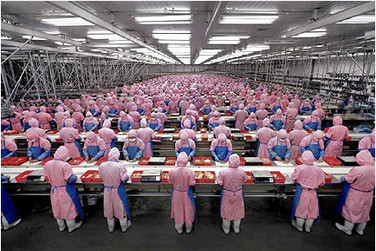 The Labor Market Bites Chinese Factories As retention of factory workers becomes a problem for companies in China, wages and benefits are increasing. But employers still face a labor shortage -- and their potential responses to it may have big implications for China and the rest of the world. By Peter Cappelli the George W. Taylor Professor of Management and director of the Center for Human Resources at The Wharton School. Read entire article This fascinating article reiterates some of the themes I have blogged about concerning the global economy. The free market for wages and labor has finally arrived in China. Coming back from Spring Festival, workers are delaying their return to shop around among factories for the highest salary and best perks. Foxconn, Apple's i-everything manufacturer, has announced wage increases that bring the Chinese factory worker on par with their counterparts in Mexico. This is coming faster than I expected in terms of a rising tide raising all boats (countries) closer to wage parity. And this will eventually budge the USA off the salary sandbar where wages have been moored for more than a decade of steady declines. Cappelli expresses hope that this turn of events will help usher in modern management practices into China such as employee retention. Wow! I never thought that I would mention that and China in the same sentence. This all bodes well for long term technology manufacturing coming back to the USA with the rising wages and costs of fuel driving that return. Steve Jobs was wrong on that one. On the other hand, there is a glut of new college grads without employment opportunities as they lack experience and training. They might be potential converts over to factory jobs according to Cappelli. However the increasing number of college grads in China will apply more competitive pressure to that same demographic sector here in the USA. Once again, this is another action call to new grads in the USA to gain internship experience, add to their portfolio of marketable skills, learn languages and build a career sustainable network to launch them well. Companies in the USA, especially the big dogs, the global multinationals need to develop immediate contingency plans to secure ongoing stable cost of goods produced including labor costs. Short-term Vietnam, other Asian nations, or Latin America will provide those options. However, long-term might look like North Dakota next to that tar sands oil pipeline. Fuel and supply chain costs to deliver to markets and cost of labor will be the deal makers or breakers in the next 5 years.
0 Comments
Leave a Reply. |
Categories
All
Archives
May 2019
Licensed by CC-by-SA
|